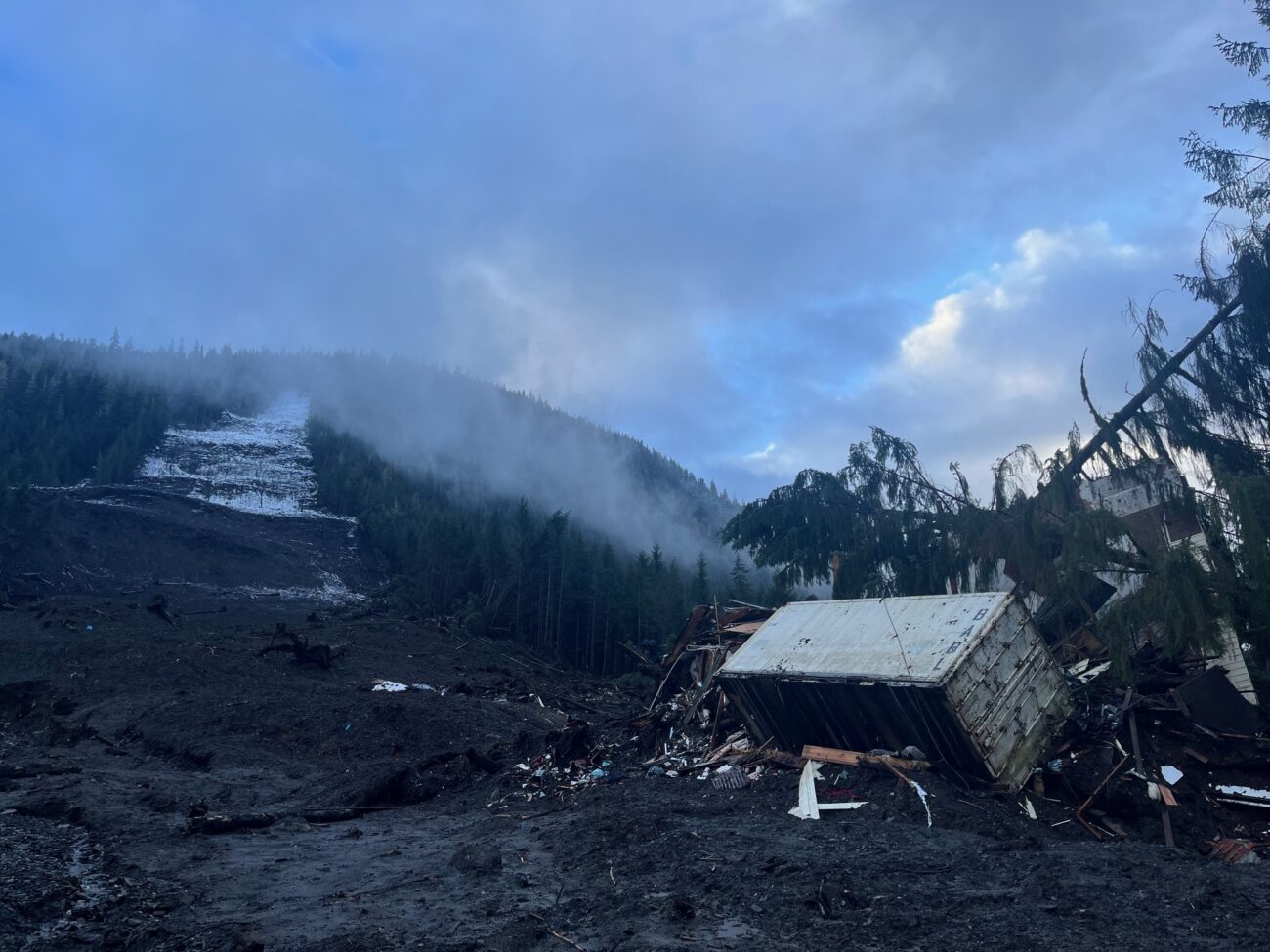By Rachel Cassandra, Alaska Public Media- Anchorage and Colette Czarnecki, KSTK- Wrangell

After Wrangell’s deadly landslide last month [November], search and rescue teams worked around the clock for days looking through debris for six missing people. Ultimately, five were found dead and the last person has not been found. For searchers, it’s exhausting and tireless work. There were, however, a few members of the team that raised morale, even if just a bit. Alaska Public Media’s Rachel Cassandra spoke with Wrangell’s search and rescue team to find out more.
Steve Prysunka, a search and rescue dog handler in Wrangell, gave “speak” commands to rescue dog Cody. Cody barked several times and Prysunka gave him a treat for obedience.
Cody is one of six specially-trained dogs that are part of Wrangell Fire Department’s search and rescue, or SAR, team.
“These dogs are kind of part of the team,” Prysunka said. “They’re worker bees.”
And a month ago, the dogs faced one of the harder jobs they’ve done. They took shifts, working in the aftermath of Wrangell’s deadly November landslide, and looked for the six people who were missing from the slide.
“This landslide was really exhausting for the dogs,” Prysunka said. “They were just plowing through that mud and that muck was pretty tough on them.”
The dogs were joined by dog teammates from Sitka and Juneau. Prysunka said in this search, dogs were used mostly to find out if the human search and rescue workers were looking in the right spots. The landslide caused extensive damage. So, the team was sorting through huge debris like piles of uprooted trees.
“A crew of searchers would identify a spot that they felt was interesting, and a dog would be brought in to verify whether there was a target,” Prysunka said.
In the end, the team found all the bodies except one. They searched for 12-year-old Derek Heller for 15 days before ending the search.
Prysunka said working with dogs can save a lot of time and really make a difference in how the work feels for the search team.
“The dogs, when they verify what the searchers are doing, it buoys their spirits to keep pushing on,” Prysunka said. “Because otherwise, you don’t know if you’re making any headway…So we kind of were, in some ways, cheerleaders, to the heroic work of the ground searchers, who just kept digging and digging and digging.”
Wrangell fire chief Tim Buness led the search and rescue team under the state troopers. He said the team being part of a small town made this search really tough.
“For us, it was a very long, difficult search,” Buness said. “Most of the searchers knew at least one or more of the family members that were lost that we were looking for. So it just kind of throws a different little wrench in it, the personal side of it, that really makes it difficult.”
But he said having dogs on the team made the search more efficient.
“They’re able to track by scent, or by air,” Buness said. “So, they’re very useful in the search where we’re in a smaller area like that, to be able to get us honed in on the area that we need to be working in.”
And that efficiency can mean a lot. Prysunka said having dogs embedded in a town’s search and rescue team means dogs can get out to search much earlier.
“If you’re waiting for dogs to fly in from somewhere else, that can take a while and the dog arrives, and it’s been flying and it’s off its game a little bit, and the handler doesn’t know the terrain,” Prysunka said. “And so, to have embedded teams is absolutely crucial.”
And in the urgency of a search and rescue, that difference in time could mean life or death for whoever is missing.
“We’re seeing more and more searches that involve elders, for example, who may have some type of cognitive impairment,” Prysunka said. “And in the Alaskan climate, hours can make a difference.”
Prysunka said when he works on search and rescue he uses a technique his wife, a doctor, taught him to help him get through emotionally.
At this point, this is not my tragedy,” he said. “I’m a helper and I’m not helpful if I make it my tragedy.”
But he said he finds it hard to let go when the SAR team can’t find someone.
“We had a search once and I searched on my own for another six months, walking back roads, looking for the person that was lost, with my dogs,” Prysunka said. “I have a hard time turning off. I don’t like not finding who I’m looking for…And I know everybody on the team feels the same way.”
He said he doesn’t know if he’ll ever stop thinking about it all.
But he said working with his dogs helps keep him present.
“You can’t be all depressed around your dogs,” Prysunka said. “They need you to lead them.”
Prysunka said he is trying to focus on the next training he and his dogs will do.
Wrangell Search and Rescue is a volunteer effort supported by local donations. To make a contribution, contact the Wrangell Volunteer Fire Department.











